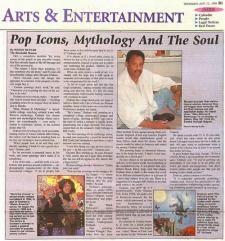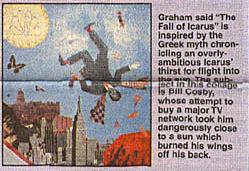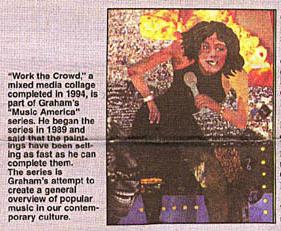|
|
|
|
|
|
from The Humboldt Beacon
 He’s
a compulsive sketcher. Yet, every sweep of his pencil or
pen unearths images that have already begun to file off
the pages and out of his possession. He’s
a compulsive sketcher. Yet, every sweep of his pencil or
pen unearths images that have already begun to file off
the pages and out of his possession.
“The minute I
finish these paintings, it’s like somebody else did
them,” said mixed media collage artist Monjett Graham.
That’s because once the
image has appeared, he considers it the property of
whoever might buy it.
“Certain paintings don’t work,” he said. “Ultimately
you’re putting the idea on the surface to be sold.”
Graham sat in his Arcata
studio- he probably would remain there all night-
finishing a painting series for an August show at
Gallery Dog in Eureka.
“Man, Woman & Mythology” is mixed media collage
matching cultural icons with Western mythology. Graham
has chosen myths and mythological beings whose
narratives are coincidentally- even eerily- similar to
celebrities’ stories, or the societal niches they fill.
Graham
strives to keep his work accessible, relating stories or
scenes without
either hitting the viewer over the head or standing back
so far that any meaning is lost to abstraction.
“When people look at art
and they can’t identify anything, I think it’s not a
good situation,” Graham said.
So, he envisions a
potential buyer in his work, and some paintings don’t
make it to completion.
A
lot of his sales- and his work are in collections and
galleries around California- are photographic
reproductions of the three-dimensional collages. “A lot
of people find them easier to live with because they’re
not 3-d,” Graham said.
It
is almost as if a visual artist comes to believe he has
to live in an isolated world of embarrassment, instead
of going out in public and marketing his product.
Authors go on book tours, Graham said.
When an artist creates a
work of are, it is usually with the hope that it will
speak to someone. Is it mercenary of that artist to want
to be compensated for their work?
“A lot of visual artists
fall into the Van Gogh syndrome,” hoping someone will
come along and discover them. It’s like the artist
communicates with himself, hoping someone will overhear,
he said.
Graham has
a large sketchpad, one page of which is filed with a
list of Greek and Roman notables.
Some of the names are
scratched out. Preliminary pictures are begun.
“He’s Icarus,” Graham said,
pointing to a completed collage, photocopied images and
layers of paint, showing an NBC logo sun to the right of
which a creature is upside down, plummeting into a large
cityscape. The photocopied face on the creature’s body
belongs to Bill Cosby.
This
first painting of the mythology series, he said, was
inspired by a report he heard that Bill Cosby had
attempted to purchase a major network and was refused.
“I saw him flying too high
and too close to the sun- in this case NBC,” Graham
said.
Graham likes
mythology, he said, because it “tells stories that are
bigger than everyday life, but can still be applied to
life, almost like a large mirror.”
He uses collage, he said,
because it “makes your eye work.”
“Your eye has to remain on
the image a little longer – a better chance of the
message sinking into the gray matter,” he said.
Graham’s paintings, often
in series form, cover African- American history,
religion, social commentary and popular music.
His “Black Holocaust”
series depicts the history of the West African slave
trade from the 16th century through the mid-19th Century
Underground Railroad.
One
painting, “Golden Triangle,” illustrates how the trade
often worked. It was spread among three continents:
England, Africa and America. English traders would take
manufactured goods to West Africa, trade them for
slaves, then the slaves would be taken to America and
traded for money. Graham said.
The
painting began as historical information in his head, he
said. “I threw it out emotionally on a sketch
pad.”
 He uses objects in the
painting that may be ordinary in the literal world, but
compelling in the metaphorical one. A red plastic belt
symbolizes blood. Rusty rings look like chains; Graham
drew a mask in the center that could be an African
ceremonial piece or a picture of a slave ship viewed
from the top. There is a suggestion of a triangle half
hidden in the dark paint, which is the ocean. He uses objects in the
painting that may be ordinary in the literal world, but
compelling in the metaphorical one. A red plastic belt
symbolizes blood. Rusty rings look like chains; Graham
drew a mask in the center that could be an African
ceremonial piece or a picture of a slave ship viewed
from the top. There is a suggestion of a triangle half
hidden in the dark paint, which is the ocean.
Graham, who
grew up in a
predominantly white Omaha, Neb. In the 1950’s, did quite
a bit of historical research for the series, which
premiered at Jahn Arts International in Minneapolis,
Minn. He included historical summaries with each of nine
paintings, and he said he learned much that he had never
been taught.
He returned to Omaha
recently, to work on a mural project with inner-city
teens. The project was called “Heart of Care, Inc.”
and was funded by the Nebraska Arts Council.
He spent one month painting and teaching with
12-to-16-year olds, and noted that views about art and
artist haven’t charged much since he was a child, he
said. All ages seem to understand what it means to be a
doctor, but an artist is an animal that defies defining.
It goes further than that,
though. “To be a creative being is not something that is
encouraged,” Graham, said. “If you’re growing up,
particularly if you want to be an artist, you won’t get
much encouragement. You don’t receive smiles until
people see that you are turning it into a bank account.”
Even so, artists continue
to be born.
“It is
extremely spiritually gratifying,” Graham said. “Part of
that gratification is that you are somehow enlightening
people, spreading something people can pick up and
share.”
Picture of Monjett quote:
Monjett Graham likes mythological stories, because
they are bigger than everyday life, but their themes art
still applicable today. His latest show, “Man, Woman
& Mythology,” is on display at Gallery Dog, 321
Third St., Eureka through August.
 “Work the
Crowd”: “Work the Crowd,” a mixed media collage
completed in 1994, is part of Graham’s “Music America”
series. He began the series in 1989 and said that the
paintings have been selling as fast as he can complete
them. The series is Graham’s attempt to create a general
overview of popular music in our contemporary culture. “Work the
Crowd”: “Work the Crowd,” a mixed media collage
completed in 1994, is part of Graham’s “Music America”
series. He began the series in 1989 and said that the
paintings have been selling as fast as he can complete
them. The series is Graham’s attempt to create a general
overview of popular music in our contemporary culture.
Back to Articles
|
|
|
© 2026
MonjettGraham.com. eBusiness Services by Concepts & Solutions. |
|
|
